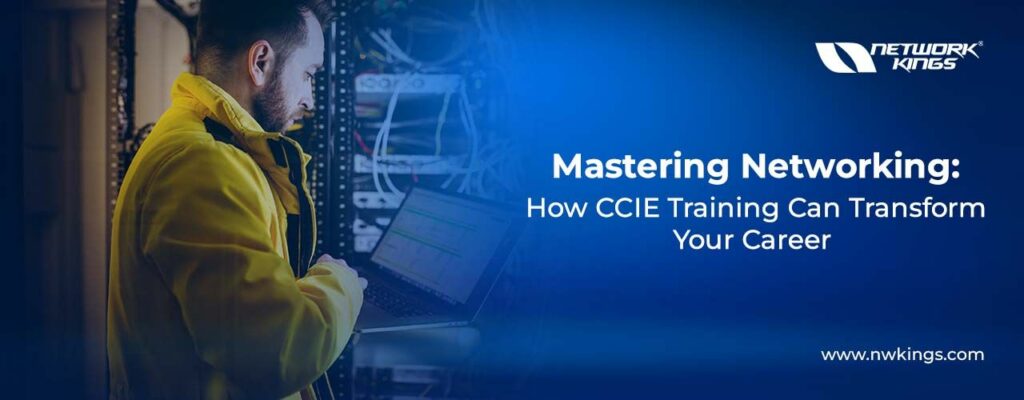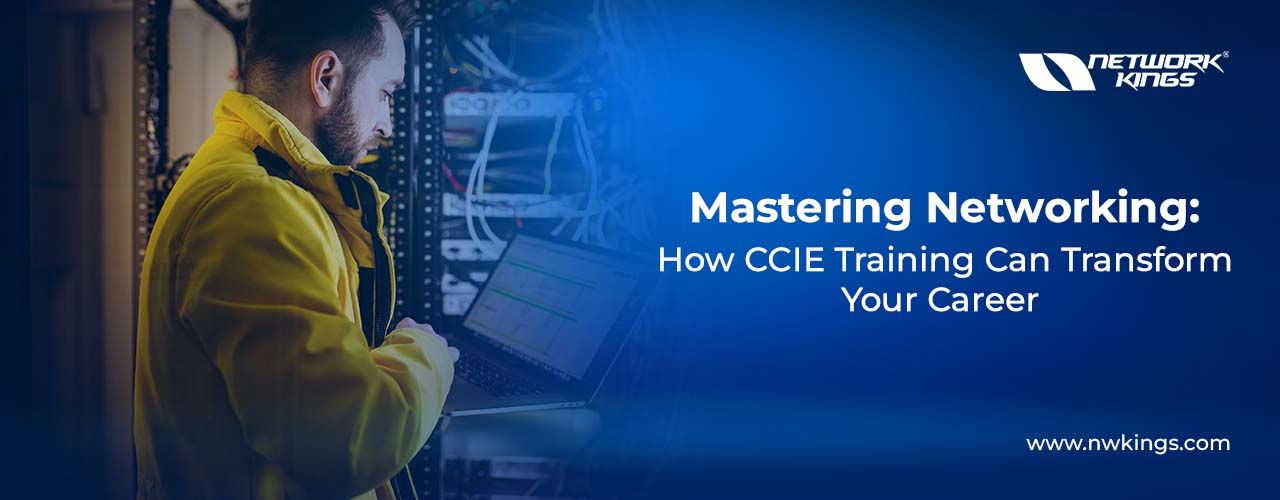
Are you looking to take your networking skills to the next level and propel your career to new heights? Look no further than CCIE training. The Cisco Certified Internetwork Expert (CCIE) certification is the pinnacle of networking certifications, demonstrating your expertise in designing, implementing, and managing complex networks.
With CCIE training, you can gain the knowledge and skills needed to master advanced networking concepts and technologies, empowering you to tackle the most challenging network infrastructure projects with confidence. Whether you’re an experienced networking professional or just starting your career, CCIE training can be a game-changer.
By becoming a CCIE, you join an elite group of networking professionals who are in high demand in the industry. This certification opens doors to exciting career opportunities, higher salaries, and increased job security. Employers recognize the value of CCIE-certified professionals in navigating the ever-evolving landscape of networking technologies.
Investing in CCIE training is a wise decision that can transform your career and set you up for long-term success. So are you ready to take the leap and become a master of networking? Start your CCIE journey today and unlock a world of possibilities.
The importance of networking certifications
Networking certifications are critical for professionals who want to advance their careers in the field. A certification demonstrates your expertise and validates your skills to potential employers. It can also open doors to new job opportunities and higher salaries.
Networking certifications also help professionals stay up-to-date with the latest technologies and trends in the industry. As network infrastructure becomes more complex, it’s crucial to have the knowledge and skills needed to design, implement, and manage networks effectively.
Overview of the CCIE certification
The Cisco Certified Internetwork Expert (CCIE) certification is the highest level of networking certification offered by Cisco. It’s designed for professionals who want to demonstrate their expertise in designing, implementing, and managing complex networks. CCIE certified professionals have a deep understanding of advanced networking concepts and technologies.
To become a CCIE, you must pass a rigorous exam that tests your knowledge and skills in a specific area of networking, such as Routing and Switching, Security, Data Center, Collaboration, or Service Provider. The exam is hands-on and requires you to configure, troubleshoot, and optimize network infrastructure in a simulated environment.
Benefits of CCIE training for career growth
CCIE training can transform your career in many ways. First, it demonstrates your expertise and validates your skills to potential employers. CCIE certified professionals are highly sought after in the industry and can command higher salaries and better job opportunities.
Second, CCIE training can help you stay up-to-date with the latest technologies and trends in the industry. The CCIE program is continually updated to reflect the latest advancements in networking, ensuring that you have the knowledge and skills needed to tackle the most challenging network infrastructure projects.
Third, CCIE training can help you develop critical thinking and problem-solving skills. The CCIE exam is hands-on and requires you to configure, troubleshoot, and optimize network infrastructure in a simulated environment. This experience can help you develop the skills needed to tackle real-world network infrastructure challenges.
CCIE training program options
CCIE training is available in several formats, including self-paced online courses, instructor-led online courses, and in-person boot camps. Self-paced online courses allow you to study at your own pace and on your schedule. Instructor-led online courses provide the structure and support of a classroom environment, but with the convenience of online learning. In-person boot camps provide intensive, hands-on training in a classroom setting.
Cisco also offers CCIE Written Exam Preparation courses, which are designed to help you prepare for the written portion of the CCIE exam. These courses cover the foundational knowledge and skills needed to pass the written exam.
Tips for successful CCIE training
CCIE training is challenging, but with the right approach, you can succeed. Here are some tips for successful CCIE training:
- Set realistic goals: CCIE training is a marathon, not a sprint. Set realistic goals and break them down into manageable tasks.
- Develop a study plan: Create a study plan that includes a mix of self-paced learning, instructor-led training, and hands-on practice.
- Practice, practice, practice: The CCIE exam is hands-on, so practice as much as possible. Set up a lab environment and practice configuring, troubleshooting, and optimizing network infrastructure.
- Join a study group: Join a study group or online community to connect with other CCIE candidates and share knowledge and resources.
- Take care of yourself: CCIE training can be stressful, so take care of yourself. Get enough sleep, exercise, and eat a healthy diet.
Real-life success stories of professionals who completed CCIE training
CCIE training has transformed the careers of many professionals. Here are some real-life success stories:
- John Doe, a network engineer, completed CCIE Routing and Switching training and was promoted to network architect at his company. He now leads network infrastructure projects and manages a team of engineers.
- Jane Smith, a security analyst, completed CCIE Security training and was hired as a security consultant at a top consulting firm. She now works with clients to design and implement secure network infrastructure.
Resources and study materials for CCIE training
CCIE training requires extensive study and practice. Here are some resources and study materials to help you prepare for the exam:
- Cisco Learning Network: Cisco’s official learning community provides study resources, practice exams, and a community of CCIE candidates and experts.
- Cisco Press: Cisco Press publishes study guides and practice exams for CCIE candidates.
- Lab Equipment: CCIE training requires hands-on practice, so you’ll need lab equipment to build a simulated network environment. Cisco offers lab equipment rental services, or you can build your own lab.
CCIE training vs. other networking certifications
CCIE training is just one of many networking certifications available. Here are some ways that CCIE training compares to other certifications:
- CCNA: CCNA is an entry-level certification that demonstrates basic networking knowledge and skills. CCIE is an advanced certification that demonstrates expertise in complex network infrastructure.
- CCNP: CCNP is a professional-level certification that demonstrates advanced networking knowledge and skills. CCIE goes beyond CCNP and demonstrates expertise in designing, implementing, and managing complex networks.
- JNCIE: JNCIE is a certification offered by Juniper Networks that demonstrates expertise in Juniper networking technologies. CCIE is a certification offered by Cisco that demonstrates expertise in Cisco networking technologies.
Conclusion: The impact of CCIE training on your career
CCIE training can transform your career by demonstrating your expertise, opening doors to new job opportunities, and increasing your earning potential. With CCIE training, you can gain the knowledge and skills needed to master advanced networking concepts and technologies. Whether you’re an experienced networking professional or just starting your career, CCIE training can be a game-changer. So take the leap and start your CCIE journey today.


